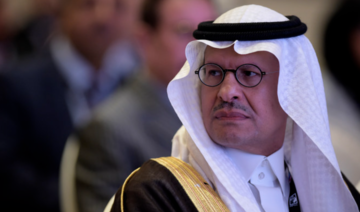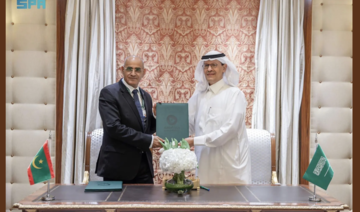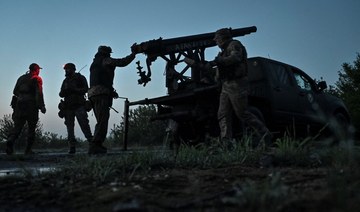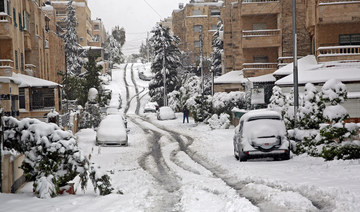VIENNA: Five former Austrian officials went on trial in Vienna on Friday accused of granting asylum to a suspected Syrian war criminal in Austria at the request of Israel’s Mossad intelligence agency.
The five are accused of abusing their positions by bringing Khaled Halabi, a former Syrian general, to Austria in 2015 and arranging asylum for him. Four are former intelligence officials and one is a former asylum agency official.
Halabi led the Syrian General Intelligence Directorate in Raqqa from 2009-2013. When rebel forces captured Raqqa in 2013, Halabi fled to France, initially applying for asylum there.
International human rights groups have documented torture in Syrian facilities under Syrian President Bashar Assad, and allege that Halabi bears some responsibility.
Austrian authorities have also initiated criminal proceedings against Halabi but haven’t indicted him. Halabi’s lawyer, Timo Gerersdorfer, told The Associated Press that Halabi is cooperating fully with Austrian authorities, and that his client is not guilty.
“He fled Syria with the help of the Free Syrian Army. If he had agreed with the Assad regime, he would have stayed in Syria,” he said.
According to an investigation by Germany’s Der Spiegel magazine and Austrian daily newspaper Der Standard, the Mossad recruited Halabi, a member of the Druze minority in Syria, as an informant. The Israeli prime minister’s office declined to comment.
Prosecutors accuse the former intelligence officials of breaching their duties to provide information about Halabi’s whereabouts and identity, particularly after a 2016 meeting at the Austrian Justice Ministry. At that meeting, representatives of the Commission for International Justice and Accountability presented evidence that Halabi was suspected of implication in potential war crimes in Syria and said France had initiated an investigation against him for possible “systematic torture.”
Prosecutor Ursula Schmudermayer told the Vienna state court that Austrian intelligence officials had traveled to Tel Aviv in March 2015 to meet Mossad agents. She said the Israeli agents informed the Austrians that the Syrian general was in France but that “cooperation with France is not working as they had envisioned,” so they wanted Austria “to step in.”
The Mossad intended to continue questioning Halabi in Austria, the prosecutor said, and paid 5,000 euros ($5,500) per month to help harbor him in Austria.
The indictment states that Martin W., who was a senior agent in Austria’s domestic intelligence agency, the BVT, at the time, concluded a “cooperation agreement with a foreign partner intelligence service” on May 6, 2015. The agreement contained details on how to bring Halabi from France to Austria and support him in applying for asylum, according to the indictment.
Martin W. was absent as the trial opened Friday due to health issues but the others were present. They answered short procedural questions but didn’t testify.
Their lawyers argued that the defendants acted correctly because all details about the cooperation agreement with the Mossad were labelled as “strictly confidential,” meaning that the agents were not allowed to disclose the operation to other state bodies.
They also argued that the cooperation agreement with Israeli intelligence helped Austria gain information that would not have been possible to receive in any other way. At the time, Europe faced the arrival of large numbers of refugees from the Syrian civil war and an increased terrorist threat.
Prosecutors accused the former asylum official, Gerald W., of manipulating the asylum procedure to enable Halabi’s asylum application in Austria though Halabi had already applied for asylum in France. His lawyer told the court that Gerald W. acted in good faith, trusting information given to him that Halabi was in danger in France.
The trial is scheduled to run through next Friday. It was not immediately clear when the court might issue verdicts.
The defendants can only be partially identified under Austrian rules.
Austrians tried for allegedly helping Mossad shield Syrian
https://arab.news/8d6ya
Austrians tried for allegedly helping Mossad shield Syrian
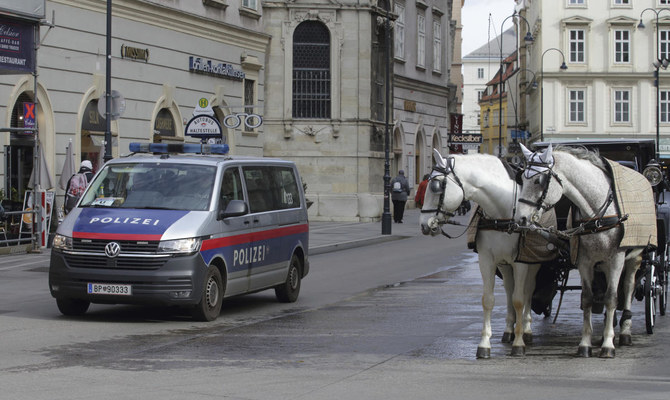
- The five are accused of abusing their positions by bringing Khaled Halabi, a former Syrian general, to Austria in 2015 and arranging asylum for him
- Halabi led the Syrian General Intelligence Directorate in Raqqa from 2009-2013
Germany failing to protect Muslims from hate: Human Rights Watch
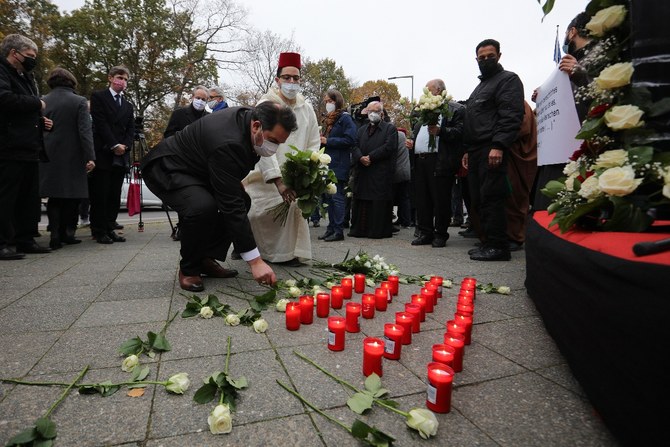
- Government ‘lacks understanding’ of racism targeting Muslim communities
- 2023 marked ‘frighteningly new high’ for hate incidents: German NGO chief
LONDON:Germany is failing to protect Muslims from growing racism amid a “lack of understanding” about the issue, Human Rights Watch has warned.
The country has yet to implement a working definition of anti-Muslim racism and frequently fails to record data on race-hate incidents, the organization said on Tuesday.
A key failing of the German government concerns its “lack of understanding that Muslims experience racism and not simply faith-based hostility,” said Almaz Teffera, a HRW researcher on racism in Europe.
“Without a clear understanding of anti-Muslim hate and discrimination in Germany, and strong data on incidents and community outreach, a response by the German authorities will be ineffective.”
Germany recorded 610 “anti-Islamic” crimes in 2022, but from the start of 2023 to September that year, the number had climbed to 686.
There are fears that the figure has further surged since the outbreak of the Gaza conflict last October.
Germany’s Interior Ministry told HRW that it could not provide data on anti-Muslim crimes from October 2023 to the year-end.
However, civil society groups in the country recorded a spike in reported incidents, leading Germany’s federal commissioner for anti-racism, Reem Alabali-Radovan, to join an EU-wide expression of concern about the rise in hate.
The Alliance Against Islamophobia and Anti-Muslim Hate, a German NGO network, documented “an average of three anti-Muslim incidents a day” last November.
The network’s chief, Rima Hanano, told HRW that “2023 marked a frighteningly new high for anti-Muslim incidents.”
Though the network collects its own internal data on the frequency of hate incidents, the German government “has yet to develop an infrastructure for countrywide monitoring and data collection,” HRW said.
The government has also classified hate incidents against Muslims as “anti-Islamic” since 2017, removing nuances surrounding the ethnic identities of victims, HRW added.
A three-year study commissioned by the government and published last year recommended that authorities “no longer dissociate anti-Muslim hate from racism,” but instead “recognize their connection.”
However, the Interior Ministry has failed to carry out the report’s recommendations, HRW said, adding: “Any focus on anti-Muslim hate and discrimination that fails to include racism or acknowledge the intersectional nature of such hostility will be unable to capture the full picture or inform effective policy responses.”
Muslim communities in Germany are a “group with a diversity of ethnicities” rather than a “monolithic religious group,” said Teffera.
“Germany should invest in protecting Muslims and all other minority communities in Germany because it is an investment in protecting all of German society.”
A gunman kills 6 worshippers inside a Shiite mosque in western Afghanistan, the Taliban say
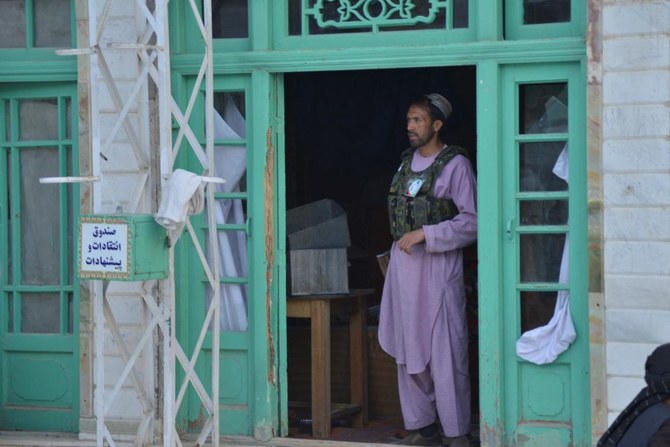
ISLAMABAD: A gunman stormed a mosque in western Afghanistan, opening fire and killing six people as they were praying, a Taliban official said Tuesday.
Local media reports and a former president of Afghanistan said the mosque was targeted because it was a place of worship for the country’s Shiite Muslim minority.
The attack happened on Monday night in the district of Guzara in Herat province, said Abdul Mateen Qani, a spokesman for the Taliban Interior Ministry. He said in a post on the social media platform X that an investigation was underway.
No one immediately claimed responsibility for the attack, which also wounded another worshipper while the attacker fled. Local media reported that the mosque's imam was among those killed.
“I strongly condemn the attack on the Imam Zaman Mosque,” former Afghan President Hamid Karzai said on X. “I consider this terrorist act against all religious and human standards.”
The United Nation Assistance Mission in Afghanistan also condemned the attack, which it said killed and wounded at least seven people, including a child. It called for urgent accountability for perpetrators and protection measures for Shitte communities.
The Islamic State group’s affiliate in Afghanistan is a major Taliban rival and frequently targets schools, hospitals, mosques and Shiite areas throughout the country.
The Taliban seized power in Afghanistan in August 2021, during the last weeks of the chaotic departure of U.S. and NATO troops from the country after 20 years of war.
Despite initial promises of a more moderate stance, the Taliban gradually reimposed a harsh interpretation of Islamic law, or Shariah, as they did during their previous rule of Afghanistan from 1996 to 2001.
Russia says United States is being hypocritical over ICC and Israel
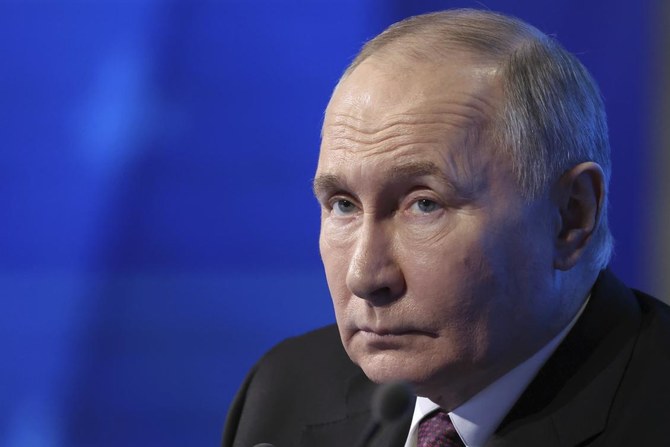
- US President Joe Biden said last year that the ICC decision to issue an arrest warrant for Putin was justified
MOSCOW: Russia said on Tuesday that the United States was being hypocritical by opposing the International Criminal Court’s (ICC) investigation of Israel but supporting the court’s warrant for the arrest of President Vladimir Putin.
The ICC — which can charge individuals with war crimes, crimes against humanity and genocide — is investigating Hamas’ Oct. 7 cross-border attack and Israel’s devastating military assault on Hamas-ruled Gaza, now in its seventh month.
White House spokesperson Karine Jean-Pierre said on Monday the United States did not support the ICC’s investigation of Israel and did not believe that the court had jurisdiction.
US President Joe Biden said last year that the ICC decision to issue an arrest warrant for Putin was justified. The United States has shared details of alleged Russian war crimes in Ukraine with the ICC.
Russia says the warrant against Putin is a meaningless attempt by the West to soil Russia’s reputation and denies war crimes in Ukraine. Ukraine says Russia committed war crimes. Russia says the West has ignored Ukraine’s crimes, a charge denied by Kyiv.
“Washington fully supported, if not stimulated, the issuance of ICC warrants against the Russian leadership,” Russian Foreign Ministry spokesperson Maria Zakharova said in a post on Telegram.
But “the American political system does not recognize the legitimacy of this structure in relation to itself and its satellites,” Zakharova said, adding that such a position was intellectually “absurd.”
The Kremlin has called the issuing of the warrant against Putin outrageous and legally void, as Russia is not a signatory to the treaty that created the ICC.
Israel is not a member of the ICC, while the Palestinian territories were admitted as a member state in 2015.
Prime Minister Benjamin Netanyahu said on Friday that any ICC decisions would not affect Israel’s actions but would set a dangerous precedent.
Israeli officials are worried that the court could issue arrest warrants against Netanyahu and other top officials for alleged violations of international humanitarian law in Gaza, Israeli media have reported.
They said the ICC is also considering arrest warrants for leaders from Hamas.
London police arrest sword-wielding man after reports of stabbing

- Police said the suspect had attacked members of the public and two officers
LONDON: British police have arrested a man armed with a sword following reports of people having been stabbed during a serious incident in northeast London although it was not thought to be terrorism-related, the capital’s police force said on Tuesday.
The 36-year old man was arrested after police were called to reports of a vehicle being driven into a house in the area close to Hainault train station, the Metropolitan Police said in a statement.
Police said the suspect had attacked members of the public and two officers.
“This must have been a terrifying incident for those concerned. I know the wider community will be feeling shock and alarm,” Metropolitan Police Deputy Assistant Commissioner Ade Adelekan said. “We do not believe there is any ongoing threat to the wider community.”
The force said the incident did not appear to be terror-related and they were not looking for further suspects.
“I am being regularly updated about the incident at Hainault Station this morning,” Britain’s interior minister James Cleverly said on X. “My thoughts are with those who have been affected.”
Gunman kills six in attack on Afghan mosque – Taliban spokesman
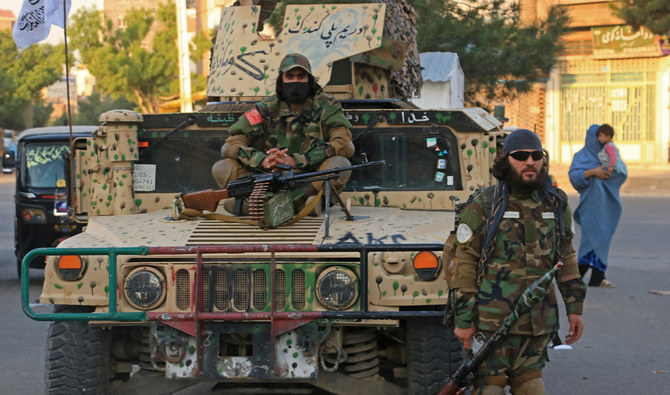
- Locals say the mosque served the minority Shiite community just south of the Afghan city of Herat
- While no group has claimed the attack, the regional chapter of Daesh is viewed as threat in Afghanistan
HERAT: A gunman stormed a mosque in western Afghanistan and killed six people, a government spokesman said Tuesday, with local residents claiming the minority Shiite community had been targeted.
Interior ministry spokesman Abdul Mateen Qani said that “an unknown armed person shot at civilian worshippers in a mosque” in Herat province’s Guzara district on Monday at around 9:00 p.m. (1630 GMT).
“Six civilians were martyred and one civilian was injured,” he wrote on social media platform X early Tuesday morning.
Locals said the mosque served the minority Shiite community in a district just south of the provincial capital of Herat city, and the imam and a three-year-old child were among those killed.
They also said a team of three gunmen staged the attack, contradicting the official account.
“One of them was outside and two of them came inside the mosque, shooting the worshippers,” said 60-year-old Ibrahim Akhlaqi, the brother of the slain imam. “It was in the middle of the prayers.”
“Whoever was in the mosque has either been martyred or wounded,” added 23-year-old Sayed Murtaza Hussaini.
While no group has claimed the attack, the regional chapter of Daesh is the largest security threat in Afghanistan and has frequently targeted Shiite communities.
The Taliban government has pledged to protect religious and ethnic minorities since returning to power in August 2021, but rights monitors say they’ve done little to make good on that promise.
The most notorious attack linked to Daesh since the Taliban takeover was in 2022, when at least 53 people — including 46 girls and young women — were slain in the suicide bombing of an education center.
Taliban officials blamed Daesh for the attack, which happened in a Shiite neighborhood of the capital Kabul.
Afghanistan’s new rulers claim to have ousted Daesh from the country and are highly sensitive to suggestions the group has found safe haven there since the withdrawal of foreign forces.
Taliban authorities have frequently given death tolls lower than other sources after bombings and gun attacks, or otherwise downplayed them, in an apparent attempt to minimize security threats.
A United Nations Security Council report released in January said there had been a decrease in Daesh attacks in Afghanistan because of “counter-terrorism efforts by the Taliban.”
But the report said Daesh still had “substantial” recruitment in the country and that the militant group had “the ability to project a threat into the region and beyond.”
Daesh chapter spanning Afghanistan, Pakistan and Central Asia claimed responsibility for the March attack on the Crocus City Hall concert venue in Moscow, killing more than 140 people.
It was the deadliest attack in Russia in two decades.





